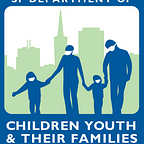For community college students, the pandemic & food insecurity are intertwined
At the beginning of the Shelter in Place Order in San Francisco, the SF Department of Children, Youth, and their Families, City College of San Francisco, and two nonprofit agencies came together to immediately address food security needs of low-income City College students. Since that time, multiple partnerships have been put in place in order to provide free meals, groceries, and other food- related assistance. Please visit the Free Meals and Food Assistance page on the DCYF website to learn more about these efforts.
Angelica Nevarez started out the year with a lot of hope. After losing her job in 2019, she enrolled at City College of San Francisco (CCSF) in order to pursue a degree in health information technology. She hoped that a new career in an in-demand field would help her improve her economic situation and that of her grandparents, who she lives with and supports.
Angelica, and many other low-income CCSF students, regularly utilized a food pantry and snack distribution program managed by the school. Every month, the pantry program provided critical food security resources for over 900 low-income CCSF students.
Then the COVID-19 pandemic hit San Francisco.
In mid-March the City & County of San Francisco issued its first Shelter-In-Place Executive Order. As a result, CCSF was required to temporarily suspend some critical student services, including the food pantry program.
The COVID-19 pandemic has brought attention to an often overlooked issue: the extent of food insecurity among students on college campuses. Students at community colleges are more likely than four-year university students to have circumstances in their lives that make navigating academic settings difficult, and the food insecurity issues created by the COVID-19 pandemic have exacerbated these challenges.
In 2015, HOPE Lab conducted the largest study of national campus food insecurity to date, and found that 45 percent of community college students report some degree of food insecurity, including a significant percentage of students who reported skipping meals because they cannot afford to buy food.
The problem is particularly acute in San Francisco, and for CCSF students in particular. In the 2018–2019 academic year, approximately 12,000 CCSF students received the California College Promise Grant (CCPG), a need-based tuition grant. Eligibility for the CCPG indicates that a recipient is living between 100%-150% of the federal poverty level. Eligibility for single-member households, for example, requires an annual income below $19,000. The total cost of community college attendance, compounded with sky-high rent and cost of living prices in San Francisco, require CCSF students to make difficult decisions in order to make ends meet.
For several years, CCSF and the San Francisco Department of Children, Youth, and their Families (DCYF) have been working together to support the Free City College program, which helps San Francisco residents attain their education goals by providing tuition-free college classes. The Free City College partnership has created robust data-sharing systems that have given both institutions a deeper understanding of the multifaceted needs of community college students. This came into play in an unexpected way due to the COVID pandemic: after CCSF’s food security efforts were suspended by the Shelter in Place Order, DCYF recognized that the students who depend on these services would need additional support, and put together a plan to provide $25.00 e-gift cards for students to use at grocery stores.
DCYF approached Moms Against Poverty (MAP), a nonprofit organization that donates funds to provide meals for SF Unified School District families, to secure funding for the gift cards. Delfarib Fanaie, CEO of MAP, immediately signed on. “When the need is there, we have to address it right away,” said Fanaie. “These students needed food. We had to work together and act quickly.”
Next, DCYF connected MAP with Students Making A Change (SMAC), a student group that is committed to improving student equity at CCSF, in order to notify students about the program, handle the application process, and distribute the gift cards to students. “We developed criteria to identify equity populations, and we made sure that the application process was easy and the turnaround was quick,” said Marjorie Blen, a senior SMAC fellow. Bryan Daley, also a senior SMAC fellow, said “SMAC acts as a bridge to connect people with resources, and we felt like we were doing exactly what should be done at this time to support students. It felt like a calling.”
The entire program was up and running in two weeks, and within three days of launching, 200 students applied for the e-gift cards.
“This population has already taken great steps to move beyond their circumstances,” said Ladan Judge, COO of MAP. “It is important for the community and organizations that work in this realm to support college students, especially those who are underserved, to help them reach their next steps.”
“The COVID-19 pandemic has emphasized how vital it is to establish and maintain strategic partnerships to provide support for San Francisco’s most vulnerable populations,” said Dr. Maria Su, DCYF’s Executive Director. “I am so pleased with how quickly we were able to join forces and distribute the gift cards to low-income students.”
Angelica learned about the program in the CCSF newsletter, applied immediately, and received a gift card. “This money isn’t just going to me — it is also going to support my grandparents with their basic needs,” she said. “I’m thankful and grateful for the $25.00 gift card. This program has given me a sense of comfort during this time.”
